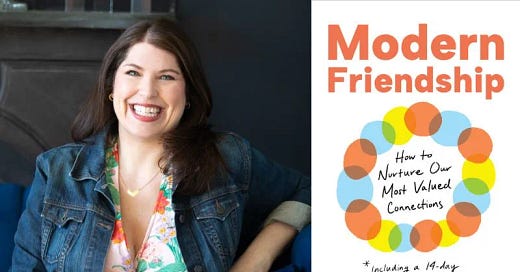Issue #44: The secrets to lasting friendships, from The New York Times “friendship correspondent”
An interview with Anna Goldfarb & the next Friendship Training Program prompts
In nearly every season of life — middle school, college, parenthood — I’ve seen how friendships can come in and out of my life like guest stars on a sitcom. When those friendships don’t organically transcend phases — guest stars stepping into full-time roles — I find myself questioning what I’m doing wrong.
As I learned in my conversation with journalist, author, and New York Times “friendship correspondent”
, it often comes back to the friendship’s “about” — or the central reason for the friendship. In our interview, Anna shared how this concept plays into lasting friendships, along with wisdom on overcoming disappointment or hurts from the past, returning to old friendships, and more.First, here are some of our favorite reader comments from Part Two of the Program:
“A friend and I had a theory we would tout years ago: ‘Friends of friends are always friends,’ and I don’t think I realized the thoughts of a drunken 21 year old me would actually become a core value.” - Jill
“One of my best friendship moments was asking my friend to become my son's godmother. We were close friends, but it was such a big ask and it said, ‘I really want you in my life forever.’ It brought us both a lot of joy and comfort.” -
“Even though I yearn for close friendships in my neighborhood and community, I always tend to fall back on the relationships I’ve held for a long time. So the action prompts will be good for me!” - Julia
Anna has written for The New York Times, The Atlantic, Time, Vice, The Cut, Vox, and The Washington Post. Her book, Modern Friendship, comes out on June 4th (pre-order it now!).
Aliza: What’s the best quality you bring to your friendships?
Anna: I’d consider myself earthquake-proof.
I understand life is complex and confusing and my friends’ priorities are going to change, just like mine. That can be scary, but I feel like the challenge of our generation is to earthquake-proof our friendships and make them more flexible and strong.
Aliza: How do we do that?
Anna: Stay attuned to what’s going on in your friend’s lives, and then find ways to make friendship work in those new phases.
For example, hanging out with my friends looks very different than it did in my twenties. I’ll run errands with a friend and her daughter. I even went along on a business trip with a friend. I try to show up in ways that are important to them while allowing them to show up for the other roles in their life. Research shows that to keep our friendships we need something called “Social Identity Support” — meaning seeing your friends for all the roles that they play in their own lives (friend, child, parent, employee, etc.)
I feel like the challenge of our generation is to earthquake-proof our friendships and make them more flexible and strong.
Aliza: Are there ways to ease this transition with our friends?
Anna: We can’t be afraid to offer reassurance. I’ll say to a friend, “I’m not going anywhere. I know that we can’t spend as much time together as we’d like, but I’ll take as much as we can get.”
Saying something like that out loud goes a long way. I feel like I can let my shoulders relax.
Aliza: Right! Aja and I have each seen how powerful it can be to put our feelings about someone into words — but it’s also scary! It’s vulnerable to say to somebody, “I care about you.”
Anna: It’s given me a lot of hope. I know there can be a lot of doom and gloom in the news about friendships or the loneliness epidemic.
But we’re masters at convincing ourselves that our friendships don’t matter to the people we love. And that’s why it’s so powerful to tell someone, “This is real and you matter to me.”
Aliza: What about when our friends aren’t able to match our level of commitment?
Anna: That’s a real risk. I lost my dad during COVID, and if I hadn’t already been in the “friendship world,” I think I might have been much more hurt by the way some people showed up for me, or didn’t. But friendship researchers know that in times of uncertainty, people can develop high social anxiety and don’t know what to do — so they do nothing.
More on this topic from Platonic Love:
Our world is extremely ambiguous, and I decided that I didn’t want to be mad at my friends for living in that ambiguous reality.
Aliza: Thank you for sharing about your dad; I’m so sorry. What did you learn from making the decision to forgive?
Anna: I actually learned mostly from an experience with my father just before he died. He was moved by something I’d written, and told me that it reminded him of his childhood best friend, whom he hadn’t spoken to in 10 or 15 years. I found the friend on Facebook, but sadly my dad never reached out to him.
A couple of days after my dad died, I thought about his friend, and reached out to his son on LinkedIn letting him know I needed to speak with his dad. 45 minutes later, we were on the phone. The friend told me he wished he’d reached out to reconnect with my father. The experience showed me that I wanted to write a book about what these friendships mean. These friendships are our legacy. They’re what we leave the world with.
Aliza: How did you get started writing about and researching friendship?
Anna: I had a blog about dating — and I had a lot of fun with that — but when I met a guy and got married, I didn’t want to write about dating anymore. It was around that time that I started reporting for The New York Times, and that’s where I fell into this beat.
I think that I needed it. After I got married, I thought my friendships would run on autopilot forever. But I was totally naive. It was so much bumpier than I’d expected.
When the pandemic struck, that changed everything. There was a need for a new set of norms. I wrote one article titled, Should You Reach Out to a Former Friend Right Now?
Aliza: Should you? What is your advice for reaching out to people that haven’t been part of your life for some time?
Anna: Yes! If you’re looking for more connection and friends in your life, going back to someone you already have a history with is often low-hanging fruit.
Every active friendship needs an about that is compelling to both people — the reason they seek each other out. But when the relationship is older, the about is probably outdated, or even absent altogether.
Aliza: How do you figure out the about?
Anna: Try to understand your intentions. What’s the goal? Do you want this to become an active friendship where you spend time staying in touch? Or do you just want to have a fun conversation about your old neighborhood?
After I got married, I thought my friendships would run on autopilot forever. But I was totally naive.
Without a clear and compelling about, the relationship will not lift off. It’s the difference between saying, “Hey, Aliza! I’ve been thinking about you lately and I miss you. We should get together sometime—”
Aliza: Oh gosh, I say that all the time, and it never leads anywhere.
Anna: Right! Now replace that with, “Hey, Aliza! I’ve been thinking about you lately and I’d love to spend more time together. What are some of your goals this year? Are there things that we could try to do together?” You may discover that your friend is also interested in, say, starting a newsletter — giving you a compelling reason to make time to be together.
And our relationships can grow from there. Some friendships may have hundreds of abouts.
Aliza: You’ve given us so many good pieces of advice on how to earthquake-proof a friendship. What are the greatest challenges of modern friendship?
Anna: It’s really hard when you don’t have a shopping list. I think of it like grocery shopping when you’re hungry. You’re going to throw everything into your cart: mozzarella sticks from the hot bar, fancy ice cream, great pizza, and so on. Then you leave and you’re like, How am I going to make dinner out of this?
Friendship is similar. It’s important to ask ourselves questions like, Who belongs in my cart? What parts of my life am I going to focus on, and who can support that?
If you enjoyed this abridged version of our conversation and want more nuggets of wisdom from Anna, subscribe to her fantastic newsletter,
, where she demystifies friendship through a pop culture lens. And order her book! Aja and I can’t wait to read it.Week Three: Reviving Past Friendships
The first two phases of our training program centered on nurturing new and current friendships. You can go back and revisit those prompts — plus the 150+ (!!) reader comments on the discussion threads — here and here.
This week, paid subscribers will have access to the third part of the program below, which focuses on re-examining — and in some cases, reviving — friendships from our past. As Anna said above, “Every active friendship needs an ‘about’ that is compelling to both people — the reason they seek each other out. But when the relationship is older, the about is probably outdated, or even absent altogether.”
Step one: Pick one or two reflection questions to respond to on the discussion board.
Reflection prompts:
Who belongs in your “cart”? What parts of your life are you most focused on right now, and who can support that?
Are there friendships from your past that you’d like to revive? Do you have an active about, or know what one might be?
Keep reading with a 7-day free trial
Subscribe to platonic love to keep reading this post and get 7 days of free access to the full post archives.










